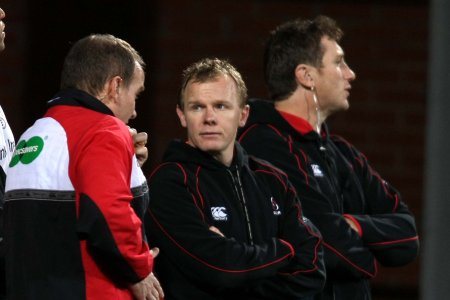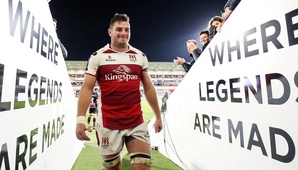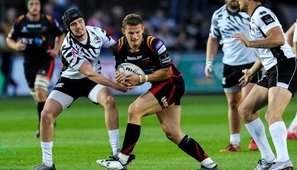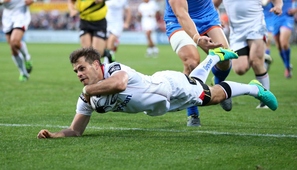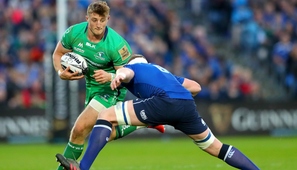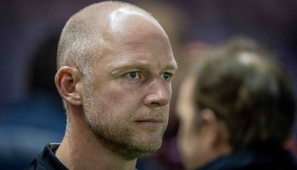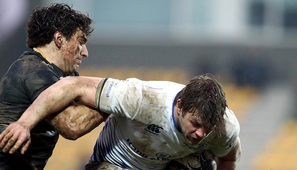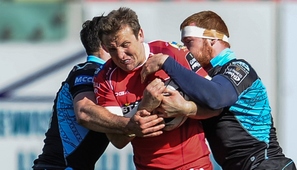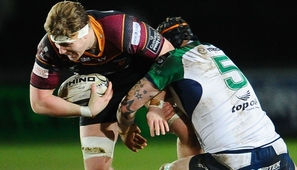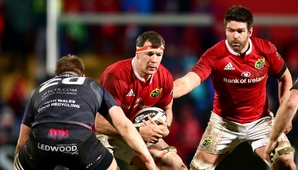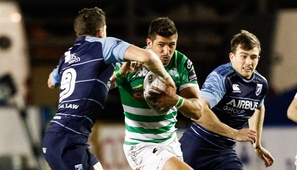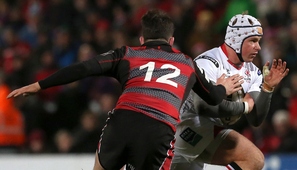Both are in London against English opponents - Munster against Harlequins at The Stoop, Ulster against Saracens across the road at Twickenham.
Of all the big guns in Europe, none has bucked the trend of losing away quarter-finals quite like Munster. They have done it three times, beating Stade Francais in Paris in 2002, Leicester at Welford Road the following year and Gloucester at Kingsholm in 2008.
Ulster have managed it once during the same period, eliminating Munster, of all people, at Thomond Park this time last year.
The tournament's ruling on a minimum capacity for the knock-out stages has at least spared Ulster the artificial grass experience at Sarries' new home in Barnet.
Instead they are going to the biggest stage of all, Twickenham where they finished a distant second to Leinster after Europe's first all-Ireland final at the end of last season.
Ironically, they now find their progress towards a second successive final challenged by a team under the direction of a formidable Ulsterman.
Mark McCall and his native province are on their first collision course since November 2007. Five seasons have come and gone since Gloucester took Ravenhill by such storm at the pool stage of the competition that their emphatic win brought McCall's tenure as head coach to an abrupt end.
The former Ireland centre had made Ulster Celtic League champions in 2006, an achievement which raised expectations that domestic success could be extended to Europe.
After watching Gloucester make light work of his team at Ravenhill on the Friday night, McCall tendered his resignation three days later.
Coaching Ulster, he said at the time, had been 'an absolute privilege'. Ulster accepted the departure of their director of rugby with regret and McCall decided in due course to try his luck across the water.
He joined Saracens in 2009, at a time when they were busy making a reputation as a club busy going to all sorts of places without quite arriving at any of them.
The advent of professionalism in 1995 resulted in their improbable conversion from a folksy little club on a parks pitch in north London into the first of a new professional breed. Sarries showed the rest the way, not least when it came to signing superstars from other parts of the rugby planet.
During those often chaotic early days of professionalism, they brought the redoubtable Wallaby Michael Lynagh from Italy and the classical centre Philippe Sella from France.
Nigel Wray, a lifelong fan, made it all possible by investing many of his millions while standing the test of time as the longest-serving of the club owners who sprang up during the latter half of the 90s.
Under McCall's supervision, Sarries eventually began to turn their off-field enterprise into on-field silverware. They became champions of England for the first time two years ago and now top the English Premiership with the meanest defence in the business - 18 tries against in 19 matches.
Europe has proved to be a different ball game entirely. Home advantage in the quarter-finals counted for nothing this time last year when Clermont brought such a ruthless precision to Vicarage Road that a boxing referee might have called a halt long before the end.
Ulster know what they're up against but then so, too, do Sarries. Last year's runners-up might have had a bit of a wobble in the PRO12 but they rediscovered their mojo against Leinster in Dublin last Saturday evening to produce a result of some significance. They survived a siege which extended the match through some seven minutes' stoppage time.
They also survived Jared Payne's sin-binning and just as Ulster began to celebrate their first win in Dublin for some 14 years, they had to wait on tenterhooks for as long as it took the TMO to rule that Leinster's last desperate throw of the dice did not end in a try for Sean Cronin.
By securing a win which brought them due reward for outscoring their neighbours 2-0 on tries, Ulster left no doubt about their sheer collective will power to win the big games.
Something will have to give at Twickenham with so much at stake, not least the promise of an Irish semi-final in Dublin should Ulster leave their former coach free to concentrate on Saracens' recapturing the English Premiership.
Meanwhile, Leinster carry the PRO12 flag in their bid to win Europe's secondary event, the Amlin Cup. The writing had been on the Heineken Cup wall for the champions since their back-to-back defeats by Clermont before Christmas, a double failure which put the skids under the Leinster dream to complete a hat-trick of winning European Cup finals.
Friday night's quarter-final against Wasps takes them to Adams Park where they last appeared in a Heineken quarter-final six years ago.
Wasps, then under the command of Lawrence Dallaglio and the coaching of Ian McGeechan, duly dispatched Leinster 35-13 en route to regaining the European title a few weeks later.
Since then Wasps have hit hard times. They escaped relegation from the Premiership last season by a single point, sending Newcastle down instead after a torrid time which spoke volumes for Dai Young's knack of coping with adversity.
Despite all the financial difficulties swirling around the club, the Welsh Lion kept them afloat during his first season since taking over as director of rugby from the Cardiff Blues.
In what is by some margin the outstanding Amlin tie of the round, Leinster ought to be good enough to make the most of their European reprieve gained as one of the three best non-qualifiers from the Heineken.












